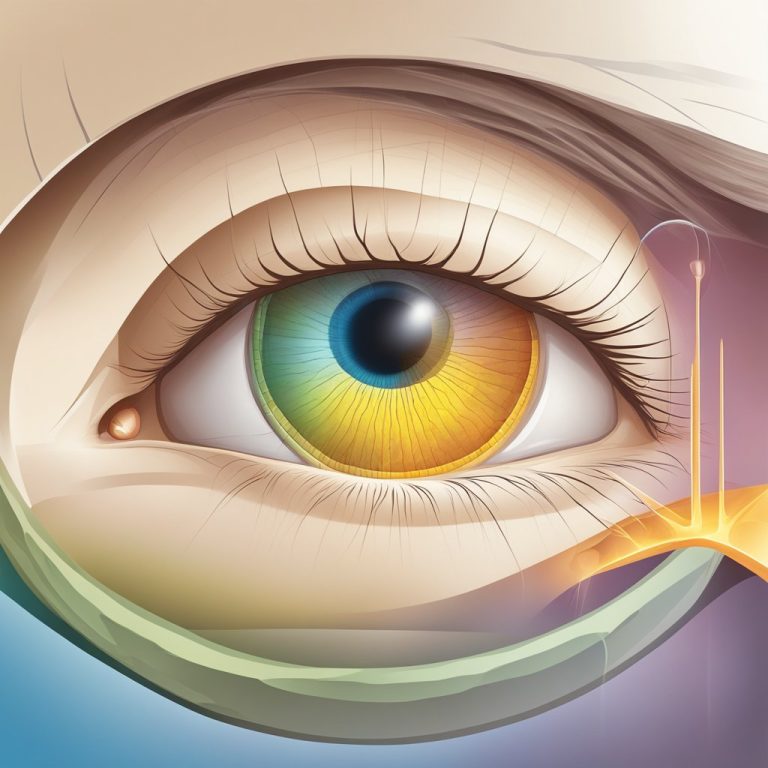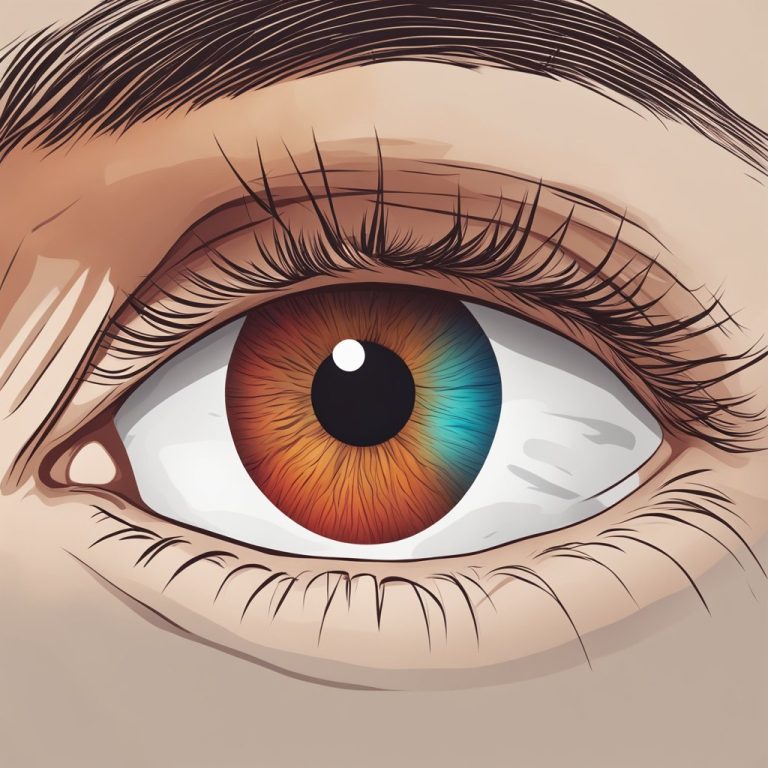Can Dry Eyes Cause Blindness?
Can Dry Eyes Cause Blindness? Exploring the Link Between Dry Eyes and Vision Loss
Understanding Dry Eye Syndrome
Dry eye syndrome is a common condition that occurs when your eyes do not produce enough tears to keep them lubricated. This can lead to discomfort, irritation, and even vision problems if left untreated.
In this section, we will discuss the causes, symptoms, and diagnosis of dry eye syndrome.
Causes of Dry Eye
There are several factors that can contribute to dry eye syndrome, including:
- Age: As you get older, your eyes may produce fewer tears, which can lead to dryness.
- Gender: Women are more likely to develop dry eye syndrome than men, especially after menopause.
- Medical conditions: Certain medical conditions, such as rheumatoid arthritis, Sjogren’s syndrome, and lupus, can cause dry eye syndrome.
- Medications: Some medications, such as antihistamines, decongestants, and antidepressants, can reduce tear production and cause dryness.
- Environmental factors: Exposure to wind, smoke, and dry air can also contribute to dry eye syndrome.
Symptoms of Dry Eye
The symptoms of dry eye syndrome can vary from person to person, but may include:
- Dryness
- Burning or stinging
- Itching
- Redness
- Blurred vision
- Sensitivity to light
- Eye fatigue
- Feeling like there is something in your eye
Diagnosis of Dry Eye
If you are experiencing symptoms of dry eye syndrome, your eye doctor may perform a comprehensive eye exam to determine the cause of your symptoms. They may also perform tests to measure the quality and quantity of your tears, such as the Schirmer test or tear breakup time test.
Once your doctor has diagnosed dry eye syndrome, they may recommend various treatments to help relieve your symptoms, such as artificial tears, prescription eye drops, or in severe cases, surgery.
It is important to seek treatment for dry eye syndrome to prevent further complications, such as corneal damage or vision loss.
Link Between Dry Eye and Blindness
Can Dry Eye Lead to Blindness?
Dry eye is a common condition that occurs when your eyes do not produce enough tears to keep the eye surface moist and lubricated. It can cause discomfort, irritation, and sensitivity to light.
While dry eye itself does not cause blindness, neglecting treatment can impact both short-term and long-term vision.
According to the American Academy of Ophthalmology, untreated dry eye can lead to corneal ulcers, corneal abrasions, and infections, which can cause vision loss. Additionally, severe dry eye can cause damage to the cornea, which can lead to scarring and vision loss.
Mechanisms of Vision Loss
The mechanisms of vision loss due to dry eye are not fully understood. However, research suggests that inflammation and damage to the cornea and conjunctiva can contribute to vision loss in severe cases of dry eye.
Inflammation can cause the cornea to become thin and develop a cone-like shape, a condition known as keratoconus. Keratoconus can lead to distorted vision and, in severe cases, vision loss.
Furthermore, damage to the conjunctiva, the thin layer of tissue that covers the white part of the eye, can cause scarring that can impair vision.
Treatment and Management
Dry eyes can be managed and treated with a combination of medical treatments and lifestyle modifications. Here are some of the most effective ways to manage and treat dry eyes:
Medical Treatments
There are several medical treatments available to manage and treat dry eyes. Your eye doctor may recommend one or more of the following:
- Artificial tears: These are over-the-counter eye drops that can help lubricate your eyes and relieve dryness and irritation. There are many different brands and types of artificial tears available, so talk to your eye doctor to find the best one for you.
- Anti-inflammatory eye drops: These prescription eye drops can help reduce inflammation and redness in your eyes, which can be a symptom of dry eye syndrome.
- Punctal plugs: These are tiny plugs that can be inserted into the tear ducts to block drainage and keep your eyes moist. Your eye doctor may recommend punctal plugs if other treatments have not been effective.
- Autologous serum tears: These are eye drops made from your own blood plasma. They can be an effective treatment for severe cases of dry eye syndrome.
Lifestyle Modifications
In addition to medical treatments, there are several lifestyle modifications that can help manage and treat dry eyes:
- Blinking exercises: If you spend a lot of time staring at a computer screen or other digital devices, you may not be blinking enough, which can cause dry eyes. Blinking exercises can help train your eyes to blink more often and keep your eyes moist.
- Humidifiers: Dry air can exacerbate dry eye syndrome, so using a humidifier in your home or office can help keep the air moist and reduce symptoms.
- Dietary changes: Certain foods and supplements, such as omega-3 fatty acids, can help reduce inflammation and improve eye health. Talk to your doctor about incorporating these into your diet.
- Avoiding irritants: Smoke, wind, and other irritants can make dry eye symptoms worse. Try to avoid these irritants as much as possible, or use protective eyewear when necessary.
Prevention Strategies
Preventing dry eyes is the best way to avoid the risk of developing severe eye problems. Here are some tips to prevent dry eyes:
1. Blink frequently
Blinking helps to keep your eyes moist and healthy. When you stare at a screen or read for long periods, you may forget to blink, which can lead to dry eyes. Make a conscious effort to blink frequently, especially when using a computer or other electronic devices.
2. Take breaks
Taking regular breaks from your computer or other electronic devices can help reduce eye strain and dryness. Every 20 minutes, take a 20-second break and look away from the screen. This will give your eyes a chance to rest and blink.
3. Adjust your environment
Dry air can cause dry eyes, especially in the winter months. Use a humidifier to add moisture to the air in your home or office. Avoid sitting near fans or air conditioning vents that can dry out your eyes.
4. Wear protective eyewear
Protective eyewear can help prevent dry eyes caused by wind and dust. When you’re outdoors, wear sunglasses that wrap around your eyes to protect them from the wind. When you’re doing housework or yard work, wear safety glasses to protect your eyes from dust and debris.
5. Use eye drops
Artificial tears or eye drops can help keep your eyes moist and reduce dryness. Use eye drops as directed by your doctor or pharmacist. Avoid using eye drops that claim to “get the red out” as they can make your eyes even drier.
Long-Term Prognosis
If left untreated, dry eyes can lead to more serious complications that could potentially cause vision loss. However, the risk of blindness due to dry eyes is relatively low.
According to a Medical News Today article, severe dry eye can cause corneal scarring, which can lead to vision impairment. In rare cases, untreated dry eye can lead to blindness.
It’s important to note that the risk of blindness due to dry eyes is much higher for individuals who have an underlying condition, such as Sjogren’s syndrome or rheumatoid arthritis. These conditions can cause severe dry eye and increase the risk of vision loss.
The good news is that with proper treatment, the risk of blindness due to dry eyes can be greatly reduced.
Treatment options include over-the-counter artificial tears, prescription eye drops, and lifestyle changes such as avoiding dry environments and taking breaks from computer screens.
In addition to treatment, there are also steps you can take to prevent dry eye from becoming a chronic condition. These include maintaining good eye hygiene, avoiding irritants such as cigarette smoke, and staying hydrated.
Frequently Asked Questions
What are the long-term effects of dry eyes on vision?
Dry eye syndrome can affect your vision in the long term if left untreated. Chronic dry eyes can lead to eye fatigue, blurred vision, and difficulty driving or reading. In severe cases, it can cause corneal damage, which may lead to vision loss.
How does dry eye syndrome impact overall eye health?
Dry eye syndrome can impact overall eye health by causing inflammation, irritation, and damage to the cornea and conjunctiva. The condition can also increase the risk of eye infections and make wearing contact lenses uncomfortable.
Can untreated dry eyes lead to vision impairment?
Yes, untreated dry eyes can lead to vision impairment. Chronic dry eyes can cause damage to the surface of the eye and lead to corneal ulcers, infections, and scarring. In severe cases, it can cause vision loss.
Is there a connection between chronic dry eyes and irreversible eye damage?
Yes, there is a connection between chronic dry eyes and irreversible eye damage. Chronic dry eyes can cause damage to the cornea and conjunctiva, leading to vision loss. In some cases, the damage may be irreversible.
What are the potential risks of dry eye syndrome if left unmanaged?
If left unmanaged, dry eye syndrome can lead to corneal damage, vision loss, and eye infections. It can also cause discomfort, eye fatigue, and difficulty performing daily activities such as reading and driving.
How can persistent dry eye symptoms affect visual acuity over time?
Persistent dry eye symptoms can affect visual acuity over time. They can cause blurred vision, eye strain, and difficulty focusing. The condition can also make it challenging to perform daily activities such as reading and driving.






